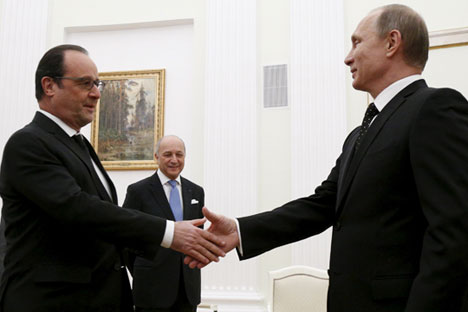Hollande & Putin: Breakthrough, perhaps, but no coalition

Russia's President Vladimir Putin (R) shakes hands with his French counterpart Francois Hollande, as members of their delegations surround them during a meeting at the Kremlin in Moscow, Russia, November 26, 2015.
ReutersFrancois Hollande’s visit to Moscow on November 26 marked the end of a diplomatic tour that he embarked upon after Islamic State terrorists attacked Paris two weeks ago, killing more than 130 people. Before his meeting with the French President, Russian President Vladimir Putin had discussed the need to intensify the fight against IS terrorists with the leaders of the USA, Britain, Germany, and Italy.
Following the meeting between the French and Russian presidents, which lasted several hours, it was apparent that a single, broad coalition to combat IS, which would include the United States and Russia, would not happen. At a press conference after their talks in the Kremlin, Putin said that Russia’s partners; a coalition of several dozen countries led by the USA acting against IS in the Middle East; are not yet ready for this kind of initiative. Hollande did not contradict his Russian counterpart. There has been no agreement on another key issue underlying the general problem in forming the coalition; the fate of Syrian President Bashar al-Assad. Hollande said that there is no place for Assad in the future of Syria, and Putin stressed that the fate of the Syrian President lies in the hands of the people of Syria.
Avoiding hints
Despite their differences, this meeting is being called a “breakthrough,” by Alexey Pushkov, head of the State Duma Foreign Affairs Committee, among others.
At the meeting, the presidents agreed, according to Hollande, “to intensify exchange of intelligence information and focus our attacks on IS and terrorist groups”. Putin said it is necessary to avoid attacking areas where there are formations present that are ready to fight against terrorists.
Pushkov, speaking on the TV channel Russia 24, interpreted this agreement as “two great powers of the modern world, two members of the UN Security Council, starting a common, and not separate, fight against the terrorist organization Islamic State”. This avoidance of using “hints and statements” in favor of “specific arrangements”, the Russian parliamentarian considers a breakthrough.
Cooperation with Russia
Analysts are more cautious, although they note the importance of the outcome of this meeting. Arrangements for coordination of operations against IS between France and Russia – “are a big deal”, believes Dmitry Danilov, head of the Department for European Security, Institute of Europe, RAS. The agreement between Paris and Moscow shows the path to other participants in the battle against IS. “The path, which one can follow, of developing cooperation with Russia”.
While a broad coalition on this project still remains distant, this can become an alternative form of cooperation between countries in the fight against terrorism. The agreements between Hollande and Putin, to coordinate their anti-terrorism efforts, can become a kind of model for other states that are also part of the American coalition.
According to Yevgeny Minchenko, director of the International Institute for Political Expertise, the mere fact that active negotiations on joint actions in Syria have started – is already important. Earlier, the analyst recalled, the US and allies actively criticized Moscow’s Syrian policy. Now the West is beginning to move away from these positions.
The analysts point out that these arrangements between Paris and Moscow are still preliminary in character, saying we need to wait and see how they will be implemented into practical cooperation. Pavel Svyatenkov, an independent expert at the Institute for National Strategic Studies said, “for now, this agreement on exchange of information and interaction does not look like anything concrete”.
Against the backdrop of the Russian-Turkish crisis
The visit of the French president may also play a positive role for Moscow’s relations with the Euro-Atlantic community. France, said. Danilov, could act as a kind of a “balance beam”. In the light of its new relations with Moscow on the Syrian conflict, Paris can exercise influence on the positions of other members of NATO and the EU, he said. These others, albeit indirectly, have now become involved in the conflict between Russia and Turkey, because of the destruction of the Russian Su-24 bomber near the Syrian-Turkish border by the Turkish Air Force. In this context, France can play a positive, calming role.
Russia and France failed to agree on the establishment of a broad coalition to combat IS
In Moscow and Paris, opposite approaches remain, when it comes to the role of the Syrian President Bashar al-Assad in the final Syrian settlement
Putin and Hollande have agreed to share intelligence and coordinate their actions in Syria against the terrorists
France and Russia must work together to determine which groups of Syrian militants should be targets of air strikes
The State Duma called the “specific arrangements” made between Putin and Hollande a “breakthrough”
All rights reserved by Rossiyskaya Gazeta.
Subscribe
to our newsletter!
Get the week's best stories straight to your inbox